虚拟语气有哪几种句型?
虚拟语气句型
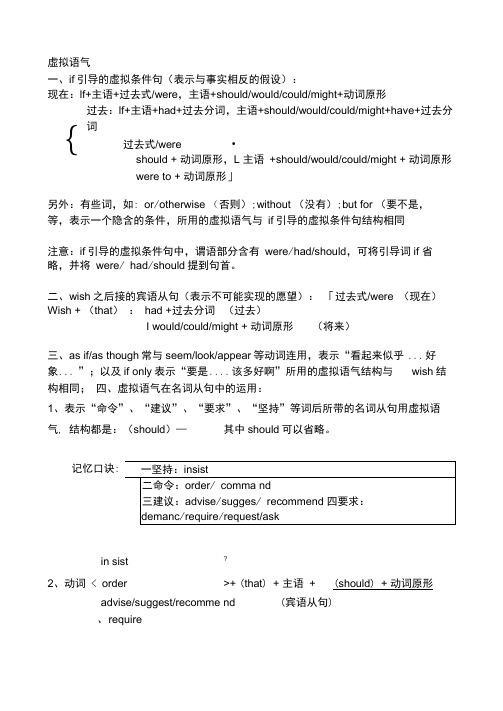
虚拟语气一、if 引导的虚拟条件句(表示与事实相反的假设):现在:lf+主语+过去式/were ,主语+should/would/could/might+动词原形过去:lf+主语+had+过去分词,主语+should/would/could/might+have+过去分词过去式/were • should + 动词原形,L 主语 +should/would/could/might + 动词原形were to + 动词原形」另外:有些词,如: or /otherwise (否则);without (没有);but for (要不是, 等,表示一个隐含的条件,所用的虚拟语气与 if 引导的虚拟条件句结构相同注意:if 引导的虚拟条件句中,谓语部分含有 were /had/should ,可将引导词if 省略,并将 were / had /should 提到句首。
二、wish 之后接的宾语从句(表示不可能实现的愿望): 「过去式/were (现在) Wish + (that ) : had +过去分词 (过去)I would/could/might + 动词原形 (将来)三、as if/as though 常与seem/look/appear 等动词连用,表示“看起来似乎 ... 好 象 ... ”;以及if only 表示“要是 .... 该多好啊”所用的虚拟语气结构与 wish 结 构相同; 四、虚拟语气在名词从句中的运用:1、表示“命令”、“建议”、“要求”、“坚持”等词后所带的名词从句用虚拟语气, 结构都是:(should )— 其中should 可以省略。
in sist? 2、动词 < order >+ (that ) + 主语 +(should ) + 动词原形 advise/suggest/recomme nd (宾语从句)、require{记忆口诀3、名词:advice/suggestion/order /request之后接表语从句或同位语从句,谓语部分也是用(should)+动词原形4、在主语从句中:It is suggested/required/ordered/ • that + 主语+ (should) + 动词原形It is importa nt/stra nge/necessary/• that + 主语+ (should) + 动词原形:过去式(现在/将来)五、would rather + sb. + €♦had +过去分词(过去)六、It is (high) time that + 主语+ 过去式【本文档内容可以自由复制内容或自由编辑修改内容期待你的好评和关注,我们将会做得更好】。
虚拟语气的八种情况

No.1虚拟语气的常见类型和句型(1)由wish引起的表示愿望的虚拟语气A.用wish表示对现在的愿望时,它所引起的宾语从句中谓语动词形式为:过去式(be动词用were)。
B.用wish表示对将来的愿望时,它所引起的宾语从句中谓语动词形式为:would, could, might+ 动词原形。
C.wish用于对过去的事实表示一种不可能实现的愿望时,宾语从句中的谓语动词形式为:had+动词过去分词或could, would + have +动词过去分词。
The picture exhibition bored me to death; I wish I had not gone to it.---“I let Joe borrow our radio for the afternoon.”---“That’s all right, but I wish he would buy one of his own.”I wish that he weren’t so lazy.(2)had hoped引起的宾语从句中备用语动词形式为would+动词原形,表示一种过去未实现的愿望或令人失望的事。
His father had hoped that his son would go to business with him, but his son became an artist later.(3)would (had) rather, would as soon, would sooner和would prefer所引起的从句中要求用过去式表示当时或将来的情况,用过去完成时表示过去的情况,表示希望或婉转的责备。
例如:I’d rather you posted the letter right away. 我倒希望你把这封信立刻寄出去。
I would prefer he didn’t stay there too long.我倒希望他不要在那儿可得太久。
虚拟语气句型
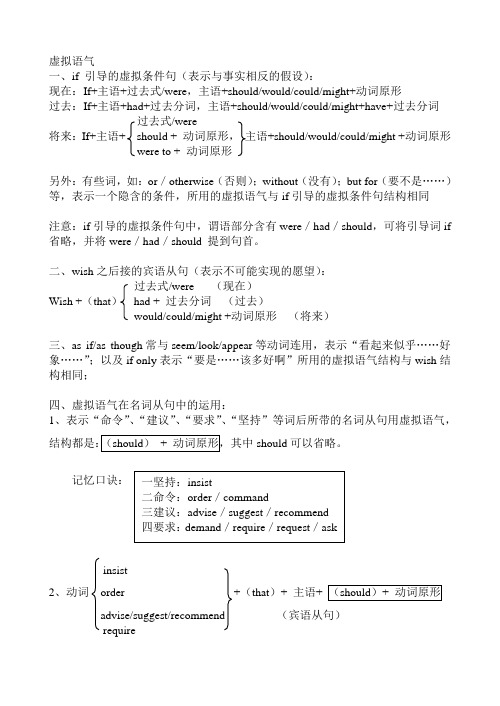
虚拟语气一、if 引导的虚拟条件句(表示与事实相反的假设):现在:If+主语+过去式/were ,主语+should/would/could/might+动词原形过去:If+主语+had+过去分词,主语+should/would/could/might+have+过去分词过去式/were将来:If+主语+ should + 动词原形, 主语+should/would/could/might +动词原形were to + 动词原形另外:有些词,如:or /otherwise (否则);without (没有);but for (要不是……)等,表示一个隐含的条件,所用的虚拟语气与if 引导的虚拟条件句结构相同注意:if 引导的虚拟条件句中,谓语部分含有were /had /should ,可将引导词if 省略,并将were /had /should 提到句首。
二、wish 之后接的宾语从句(表示不可能实现的愿望):过去式/were (现在)Wish +(that ) had + 过去分词 (过去)would/could/might +动词原形 (将来)三、as if/as though 常与seem/look/appear 等动词连用,表示“看起来似乎……好象……”;以及if only 表示“要是……该多好啊”所用的虚拟语气结构与wish 结构相同;四、虚拟语气在名词从句中的运用:1、表示“命令”、“建议”、“要求”、“坚持”等词后所带的名词从句用虚拟语气,结构都是:(should ) + 动词原形,其中should 可以省略。
记忆口诀:insist2、动词 order +(that )+ 主语+ (should )+ 动词原形advise/suggest/recommend (宾语从句)require一坚持:insist 二命令:order /command 三建议:advise /suggest /recommend 四要求:demand /require /request /ask3、名词:advice/suggestion/order /request之后接表语从句或同位语从句,谓语部分也是用(should)+ 动词原形;4、在主语从句中:It is suggested/required/ordered/…that + 主语+ (should)+ 动词原形;It is important/strange/necessary/…that + 主语+ (should)+ 动词原形;过去式(现在/将来)五、would rather + sb. +had + 过去分词(过去)六、It is (high) time that + 主语+ 过去式鱼儿,在水中串上串下,吐着顽皮的泡泡;鸟儿从荷叶上空飞过,想亲吻荷花姑娘的芳泽。
虚拟语气15种句型
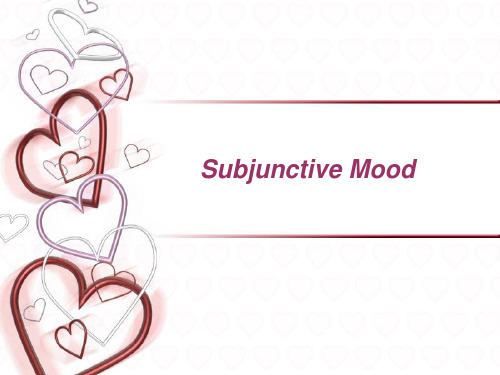
(the past)
1 If someone had given you a valuable painting as a present, what would you have done with it? 2 If you had become the head of the United Nations, what would you have done first? 3 If you had travelled anywhere in the world,where would you have gone and what would you have done?
Subjunctive Mood
1.虚拟条件句
含义 动词形式 If 从 句 现在 did/were
主句
would/should/ did/were could/might+ 将来 were to+do do 与事实 should+do 相反 would/should/ 过去 had+done could/might+ have done
1. 表示命令/建议/要求的词所带的从句 记住以下动词以及他们的名词。 建议:suggest / recommand / advise / propose 要求:require / request / demand / ask / desire 命令:order / command/ 坚持:insist 不过是动词还是名词,不过是主动还是被动 ,后面带的不管是主语从句, 宾语从句, 表语从句还是同位语从句, 都要用should do
ห้องสมุดไป่ตู้
5
(the future)
1 If someone gave you a valuable painting as a present, what would you do with it? 2 If you were to become the head of the United Nations, what would you do first? 3 If you should travel anywhere in the world,where would you go and what would you do?
常见的虚拟语气句型
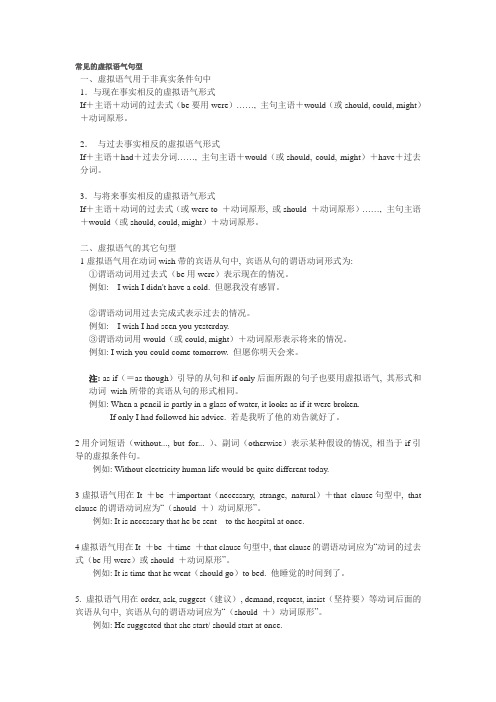
常见的虚拟语气句型一、虚拟语气用于非真实条件句中1.与现在事实相反的虚拟语气形式If+主语+动词的过去式(be要用were)……, 主句主语+would(或should, could, might)+动词原形。
2.与过去事实相反的虚拟语气形式If+主语+had+过去分词……, 主句主语+would(或should, could, might)+have+过去分词。
3.与将来事实相反的虚拟语气形式If+主语+动词的过去式(或were to +动词原形, 或should +动词原形)……, 主句主语+would(或should, could, might)+动词原形。
二、虚拟语气的其它句型1虚拟语气用在动词wish带的宾语从句中, 宾语从句的谓语动词形式为:①谓语动词用过去式(be用were)表示现在的情况。
例如: I wish I didn't have a cold. 但愿我没有感冒。
②谓语动词用过去完成式表示过去的情况。
例如: I wish I had seen you yesterday.③谓语动词用would(或could, might)+动词原形表示将来的情况。
例如: I wish you could come tomorrow. 但愿你明天会来。
注: as if(=as though)引导的从句和if only后面所跟的句子也要用虚拟语气, 其形式和动词wish所带的宾语从句的形式相同。
例如: When a pencil is partly in a glass of water, it looks as if it were broken.If only I had followed his advice. 若是我听了他的劝告就好了。
2用介词短语(without..., but for... )、副词(otherwise)表示某种假设的情况, 相当于if引导的虚拟条件句。
例如: Without electricity human life would be quite different today.3虚拟语气用在It +be +important(necessary, strange, natural)+that clause句型中, that clause的谓语动词应为“(should +)动词原形”。
虚拟语气15种句型
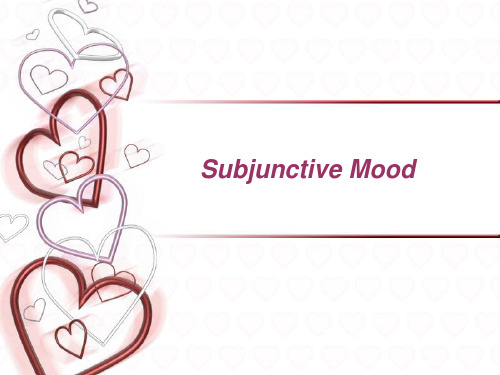
含义 动词形式 If 从 句 现在 did/were 主句
would/should/ did/were could/might+ 将来 were to+do do 与事实 should+do 相反 would/should/ 过去 had+done could/might+ have done
6. 虚拟语气表示祝愿 1. Long live Chairman Mao! 2. God bless you! 3. May you have a long and happy life! 4. Wish you a happy birthday! 注意:动词用原形 后边用 注意 动词用原形,后边用 动词用原形 后边用! may+人+do! 人 wish + 人+名词 名词! 名词
• If I had not lost her phone number, I would have rung her up. (用otherwise, but和or分别造句) • I lost her phone number. Otherwise, I would have rung her up. • I would have rung her up but I lost her phone number. • I lost her phone number or I would have rung her up.
5.动词形式为 动词形式为(should)+do 的虚拟 动词形式为 2. It’s + adj.+that 的主语从句 (adj: necessary / essential/ important / natural / strange / possible / impossible
虚拟语气(整理版)
虚拟语气(整理版)虚拟语气定义:虚拟语气指不行能实现的愿望或与事实相反的状况,而不表示客观存在的事实。
大致可分为以下几种状况:一、虚拟条件句(Unreal conditions)(一)含有if条件句的主从句的虚拟语气总结:1. If条件句中谓语动词的虚拟结构是在本来陈述语气所用时态的基础上倒退一个时态(对未来虚拟的were to do/should do例外)2. 主句要借助于情态动词的过去式,后跟动词原形(现在或未来)或have done(过去);if条件句中只浮现一个情态动词,即对未来虚拟的should.3.做此类题目时一定要分清是从句还是主句谓语动词的虚拟,还要掌握好时态。
注重:1. 在虚拟条件从句中,动词“be”的过去时态一律用”were”,不用was。
2. 在虚拟条件状语中假如有were, should, had这三个词中任何一个,可省略if,把这三个词提到主语提之前, 变成:were/should/had +主语+剩余成分。
3.在虚拟条件状语从句中,省略连词的倒装形式的句首不能用动词的缩略形式。
如我们可说Were I not to do., 而不能说Weren…t I todo。
4.在表示与未来事实相反的条件句中,只能用should,而不能用would,could和might 等。
5.主句中的should通常用于第一人称,would,could以及might 可以用于各种人称(二)混合虚拟条件句当假设条件句的主句和从句不表达同一时光的时候,我们应使用混合时光的假设条件句,动词的形式要分离按照它所表示的不同时光做相应的调节,变法同if条件虚拟句的主从句谓语动词变法。
(三)含蓄条件句在含蓄条件句中,我们常使用otherwise ,or, but以及with ,without ,but for开头的介词短语来代替条件句。
注:1. but for =1)If it weren’t fo r(对普通现在时虚拟)2)If it hadn’t been for(对普通过去时虚拟)2.分句(直陈)+otherwise/or+分句→对主句谓语动词的虚拟3.分句(对主句谓语动词虚拟)+but/unfortunately+分句(直陈)4.with/without/but for+宾语+句子(对主句谓语动词虚拟)填空:1. 假如现在不下雨的话, 我们就出去野餐了。
虚拟语气十大句型
虚拟语气的十大句型一、虚拟条件句:条件状语从句是非真实情况,在这种情况下要用虚拟语气。
1.条件从句与现在事实不一致,其句型为:句型1:If +主语+过去时,主语+ should (could, would, 或might) +动词原形(1) If I were you, I would study hard.(2) If it rained, I would not be here now.2.条件从句与过去事实不一致,其句型为:句型2:If +主语+had+过去分词,主语+ should(could, would, 或might)+ have +过去分词(3) If the doctor had come last night, the boy would have been saved.(4) If I had not studied hard, I would have failed in the exam last term. 3.条件从句与将来事实不一致,其句型为:句型3:If +主语+过去时/ should +动词原形/ were to+动词原形,主语+ should (could, would, 或might) +动词原形(5) If it should rain tomorrow, we would stay at home.(6) If I were to go to the moon one day, I could see it with my own eyes.(7) If you missed the film tonight, you would feel sorry.注意问题:1.If条件句中绝对不可以出现would。
2.根据句中的时间状语,有时可能出现“混合虚拟”的情况,即主句可能是现在的情况,条件句也许是发生在过去的情况,但都要遵守上述句型。
如:(8) If you had studied hard before, you would be a college student now and you would graduate from a college in four years’ time.3.条件句中如果出现were, had, should可省去if,将主语与这些词倒装。
虚拟语气句型
常用虚拟语气句型1.if条件句条件状语从句可分为真实条件句,即条件满足,事实就发生的情况;和非真实条件句,即与事实相反或难以实现的假设情况。
虚拟语气的基本句型,即是这种非真实条件状语从句。
If I had got up early, I wouldn’t have been late.If I were to do it, I should do it at once.【说明】①在非正式英语中,条件从句中的第一、第三人称单数主语后可用was代替were。
If I was you, I would accept the invitation.②主句中的would可用于各种人称,而should只用于第一人称。
③在主句中也可用情态动词could,might代替would,should。
If I had had enough time, I might have done it better.④条件从句中的谓语动词含有were,had,should时,可以省略从属连接词if,然后采用倒装结构,把were,had,should移到主语前面。
Should you pass this way, do drop in for a visit.= If you should pass this way,…… Had I known it, I wouldn’t had made such a silly mistake.= If I had known it,…… Were it left to me to decide whether I should have a job immediately or go on to study at college, I wouldn’t hesitate a moment to choose the latter.= If it were left to me to decide……..⑤在同一个句子中不能一部分表示真实条件,另一部分表示非真实条件。
虚拟语气分三种情况来掌握
虚拟语气分三种情况来掌握:1、虚拟条件句。
2、名词性虚拟语气。
3、虚拟语气的其他用语。
一、虚拟条件句:条件状语从句是非真实情况,在这种情况下要用虚拟语气。
1、条件从句与现在事实不一致,其句型为:If 主语+过去时,主语+should(could, would,或might)+动词原形,如:If I were you, I wouldstudyhard.If it rained, I wouldnot be here now.2、条件从句与过去事实不一致,句型为:If 主语+had+过去分词,主语+should(could, would,或might)+have+过去分词,如:If the doctor had come last night, the boy wouldhave saved.If I had not studie d hard, I wouldhave failed in the exam last term.3、条件从句与将来事实不一致,句型为:+do,主语+should(could…)+原形do过去时(与现在事实条件句一样)。
If it should rain tomorr ow, we wouldstay at home.If I were to go to the moon one day, I couldsee it with my own eyes.If you missed the film to night, you wouldfeel sorry.注意问题:1、If条件句中绝对不可出现“would”。
2、根据句中的时间状语,有时可能出现“混合虚拟”的情况,即主句可能是现在的情况,条件句也许是发生在过去的情况,但都是遵守上述句型。
3、在条件句中如果出现we re, had, should可省去if,将主语与这些词倒装,例如:Had the doctor come last night, the boy wouldhave saved.Were I to go to the moon one day, I wouldsee it with my own eyes.Should it rain tomorr ow, we wouldstay at home.二、名词性虚拟语气:在表示命令、建议要求、惊叹时的名词性从句中需用虚拟语气,基本句型:主语+(should)+动词原形,如:Mother insist ed that John go to bed at 9 o’clock.(宾语从句)We sugges ted that the meetin g should not be held.It was requir ed that the cropsshould be harves ted at once.(主语从句)The sugges tionthat he be invite d was reject ed.(同位语从句)That is theirdemand that theirwagesbe increa sed.(表语从句)注意:在这种句子中绝不出现“would”“must”“could”等。
- 1、下载文档前请自行甄别文档内容的完整性,平台不提供额外的编辑、内容补充、找答案等附加服务。
- 2、"仅部分预览"的文档,不可在线预览部分如存在完整性等问题,可反馈申请退款(可完整预览的文档不适用该条件!)。
- 3、如文档侵犯您的权益,请联系客服反馈,我们会尽快为您处理(人工客服工作时间:9:00-18:30)。
虚拟语气有哪几种句型?
(1)对现在情况的虚拟
对现在情况的虚拟,条件句中谓语动词用一般过去时,主句用“would/should/might/could+动词原形”.
(2)对过去情况的虚拟
对过去情况的虚拟,条件句中谓语动词用过去完成时,主句用“would/should/might/could+have+过去分词”.
(3)对将来情况的虚拟
对将来情况的虚拟,条件句中谓语动词可用should do,were to do 或动词的过去式三种形式表示,但意义略有不同.should表示的可能性最大,动词过去式的可能性次之,were to do的可能性最小.主句谓语动词用“would/should/might/could+动词原形”.
(4)错综时间条件句
有时条件从句谓语动词表示的动作和主句谓语表示的动作发生的时间不一致,这类句子称为错综时间条件句.此时主从句动词的形式应根据各自所表示的时间进行调整.
If you had taken my advice then,you wouldn't be in trouble now.
如果当时听我劝,你现在就不会有麻烦了.(if条件句是对过去的虚拟,故用过去完成时,而主句是对现在的虚拟,故用“would+动词原形”形式.)
(5)表示“建议、命令、要求、坚决做”等动词后的宾语从句常用“(should+)动词原形
(6) wish后的宾语从句
wish后的宾语从句用一般过去时表示现在的情况,用过去完成时表示过去的情况,用would/could do表示将来的情况.
(7) would rather 后的宾语从句
would rather后的从句常用一般过去时形式,表示现在或将来的情况;用过去完成时,表示过去的情况
(8)It is/was important (necessary,appropriate,proper,right,essential,vital,etc.) that。
